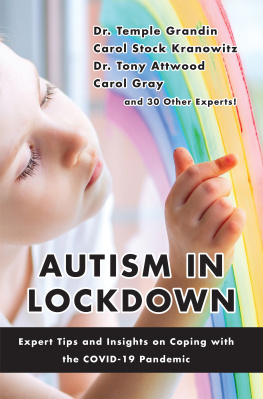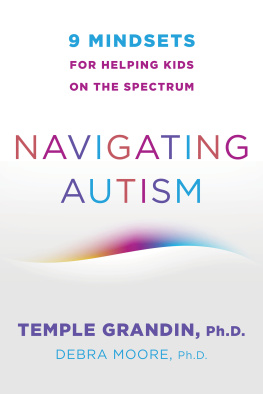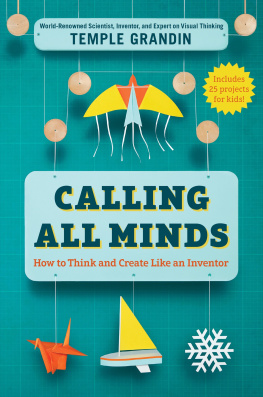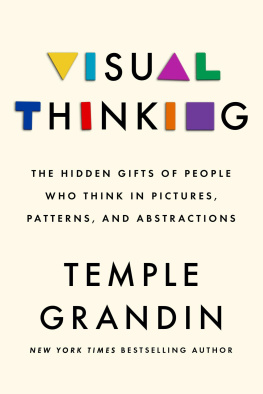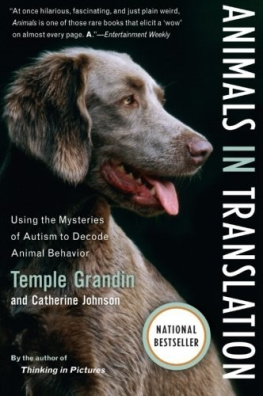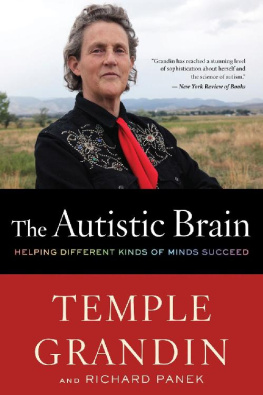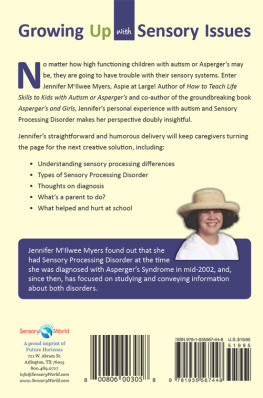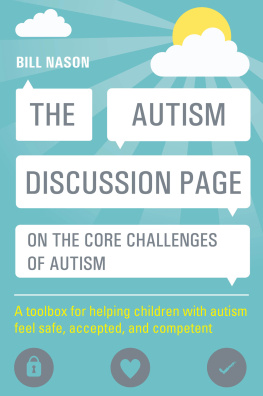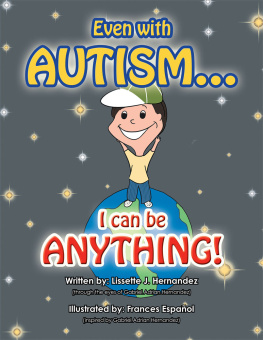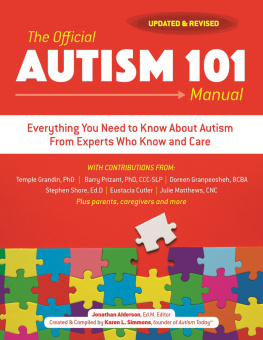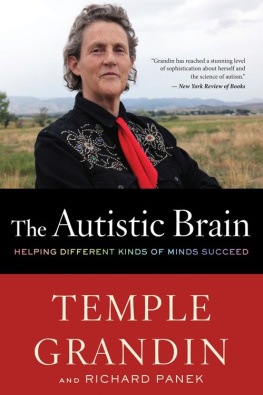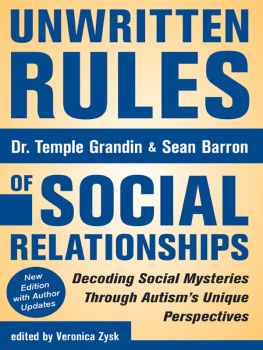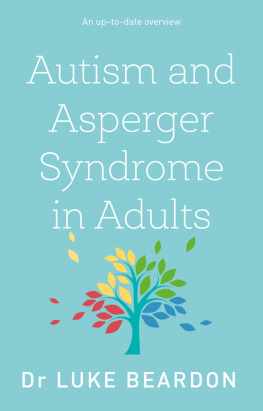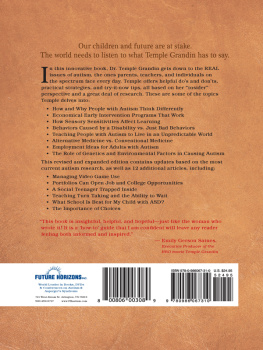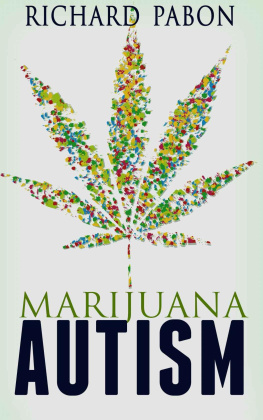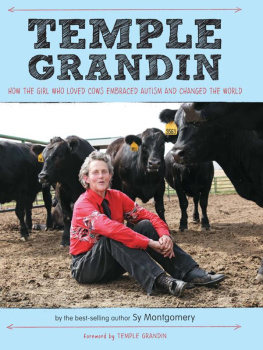AUTISM IN LOCKDOWN
All marketing and publishing rights guaranteed to and reserved by:
(800) 489-0727
(817) 277-0727
(817) 277-2270 (fax)
E-mail:
www.fhautism.com
2020 Future Horizons
All rights reserved.
Printed in USA.
No part of this product may be reproduced in any manner whatsoever without written permission of Future Horizons, Inc., except in the case of brief quotations embodied in reviews or unless noted within the book.
ISBN: 978-1949177534
eBook Designed by Acepub
INTRODUCTION
T his book would, quite simply, not exist without the Future Horizons and Sensory World authors who made it happen. I want to thank everyone for their swi and generous contributions. On April 25, I asked if any authors were interested in contributing to a little book about the quarantine, and the response was overwhelming. I dont say that lightly. The flood of response to my inbox literally brought tears to my eyes. Everyone wanted to help. We have the best authors in the world.
As you can imagine with such a project, time was of the essence. This book is one that is needed NOW, not next year (hopefully). The nine to twelve months we usually spend bringing a book from manuscript to final version had to be completed in just a few weeks.
To speed things along and get the needed information into your hands more quickly, we had to forgo the weeks of copyediting that usually go into a book. So please forgive any minor errors you may come across. You wont find perfection, but you will find information that is both insightful and helpful.
Also, the articles may have some overlap. We did not have the time for each author to see the final product and make minor adjustments. If you see that several authors mention a subject in their writings, this just means that issue is even more important.
This is the first book we made, knowing it would soon be obsolete. Soon enough we will not need this book, but you can keep it on your shelf as a collectors item.
Thank you so much and I hope this information helps you and your family during the quarantine months. Hang in there, everyone.
Jennifer Gilpin Yacio
President
Future Horizons
I t is important to remember that kids with autism have an acute sensitivity to anxiety in others. Anxiety is contagious.
There are so many reasons to be anxious all around us these days. We have news reports that discuss the killer virus, along with a number of people who have died. And this number is rising, yet to reach the peak. Yet another reason to be worried!
Kids with autism are feeling the pain of the world. They see scenes on television and have such empathy, that they have trouble moving on from what they have seen.
They are likely to develop anxiety for the health of their parents and/or grandparents. Add to that the fear of uncertainty. We are in uncertain times. This is challenging for all of us, but more so for people with autism, who rely on routine so strongly.
So, what do we do? Family and caregivers must be calm, confident and optimistic, so their kids can pick up on this attitude. If fear is contagious, so is calm.
One way to keep a sense of calm in your household is to limit your news time. Watch the news once a day, not continuous 24-hour news cycle. Then turn it o and go play a game or take a walk. Discuss what you have seen and what gives you hope. Help them digest what they have just seen.
INCREASE IN THE SIGNS OF AUTISM
Many of the characteristics of autism are coping mechanisms or associated with anxiety and stress. So, when stress levels go up, so do the signs of autism.
You may very well see an increase in social withdrawal, routines and rituals, sensory sensitivity, and engagement in their special interest.
MANAGING INTENSE ANXIETY
So, what do we do to take care of the anxiety causing the rise in autistic behaviour? As we discussed earlier, family and caregivers need to remain calm.
First o, validate their feelings. You can say something like, I can see that you are feeling worried about the future, and that is understandable.
Please, do not ask the person to explain what they are anxious about. This may cause even more anxiety and you may see a lack of eloquence, coherence and sequence in their attempt to explain. What you need to do is move through and out of the distress, not return to where it began.
If the person is unreasonable at this stage, then reason will be ineective. Empathize and explain that the intense anxiety or distress will go away.
Praise and encourage them as they become calmer and share gratitude that the anxiety is going away.
Validate and sit with feelings as they decompress. Help them notice feelings in their body, then use a strategy to help reach a calmer state of mind (e.g. grounding, breathing, act in line with values and goals etc).
INFORMATION
Sharing information during a crisis is necessary. Yet how do we do this without causing more distress? Try to share the information you have in an honest, reassuring and practical way.
Model how to cope with the information they are receiving. Do this by vocalizing your thoughts. This helps encourage positive self-talk.
Health is on everyones mind and the inherent difficulty of perceiving low-level signs of infection and pain are an aspect of autism that is relevant in determining if the kid is coming down with the virus. Use a thermometer for objective information. If they do not show a fever, this may help calm anxieties.
CHANGES IN DAILY ROUTINE
Everyones routines are disrupted, and new routines are taking their place. It is important to help people with autism cope with change as much as possible.
Suddenly everything is on hold. It is like a holiday, but we are unable to do what you like to do on a holiday. This is very frustrating.
We are not having family gatherings and outings anymore and cannot see the people we may want to see. This is even more frustrating and sometimes anxiety producing. What if something happens to our loved ones while we are away from them? This uncertainty is tough for all of us to deal with, but we know our loved ones are also being safe in their homes. Explain that and explain what makes you feel safe about your loved ones who are away from you. Spend some quality time with people you are worried about on a video chat.
We all have so much more free time and it is important that this time is not totally taken up by the computer. DO get outside if you can. A walk can do wonders for your mind. Also important is having a to do list of things you can complete around the house to get rid of the anxiety energy you now have. Some of the best activities are those that bring order out of chaos, such as decluttering the attic or basement. Organize your closet and get rid of old clothes. When you create order out of chaos, you gain a sense of control in an uncontrolled world. This is necessary for our collective sanity right now.
STRATEGIES TO MANAGE STRESS
There is often conflict in the family due to being cooped up together. It is easy to take up your frustrations on the ones you are stuck with but try to use some anger management and step away when you find yourself losing your sense of calm.
Next page
